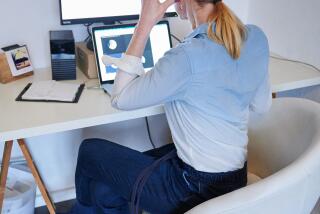Fitness Researcher Seeking 55,000 People to Take a Walk for Science
- Share via
BERKELEY — Exercise and health researcher Paul Williams wants 55,000 people to take a walk--a lot of walks--and then report back on how they’re feeling.
Along the way he hopes to find answers to the couch potato’s conundrum: Is there gain without pain?
“We want to answer the question, ‘Does walking give the same benefits as running, or do you need to walk more to get the same benefits, or faster to get the same benefits?’ People need to have some very scientific answers,” Williams said.
Williams already has challenged the comforting philosophy that moderate exercise is as good as an intense workout with findings from his ongoing National Runners’ Health Study.
Reports from that study, the nation’s largest of long-distance runners, found that more was more. Men who ran more than 40 miles a week had a smaller risk of coronary heart disease than those who ran less than 10 miles.
Now, Williams is launching a companion study of walkers that will again look at the question of how much exercisers earn by going for the burn.
“We think the exercise recommendations are based on very little data that specifically address vigorous exercise like running,” said Williams, who is with the Ernest Orlando Lawrence Berkeley National Laboratory.
A runner himself, Williams admits he doesn’t have time to put in 40 miles a week. And he agrees that for a nation whose chief exercise seems to be walking from sofa to refrigerator, any exercise is better than none.
But he wants people to know the fitness facts.
“Our concern is that many people are getting the message that if they clean their house half an hour a day that’s all they need to do, and we think that’s probably not true,” he said.
(Several government reports, including one last summer by the U.S. Surgeon General, have recommended daily moderate exercise as essential to good health.)
By early March, about 2,000 people who had heard about Williams’ study, written up in the February edition of Walking Magazine, had gotten in touch with him.
“It’s a start. We’ve got a long way to go,” he said. “We are receiving responses throughout the country.”
Seth Bauer, editor-in-chief of the Boston-based magazine, which has a circulation of 625,000, is enthusiastic about the study. He views it as another indicator that fitness walking--practiced by about 17 million Americans versus the estimated 9 million runners--is gaining ground.
“I think walking has really become so popular in this country and so prominent that it is getting a lot of respect,” Bauer said.
Study subjects will fill out questionnaires on how far, how frequently and how fast they walk. The walkers will be contacted every five years to assess their health.
Williams said health issues are the same as in the runners’ study, but there are a few differences.
For one thing, while runners usually go out once a day at most, walkers often take a couple of constitutionals a day, which may affect health benefits.
There’s another big difference between walkers and runners. Walking tends to be the exercise of choice of women while the majority of runners are male.
Do women know something men don’t?
“I have often held that women have a more balanced view. I would submit that they’re the smarter gender on average,” said Mark Fenton, editor-at-large of Walking Magazine.
He theorized that men are more susceptible to the desire to appear competitive at work or play.
Fenton and Bauer hoped Williams’ study would back up their premise that walkers are taking the road to good health.
“The fact is that so much of the American population, up to 80%, is essentially sedentary. Thirty-five percent or so is entirely sedentary,” Bauer said. “For all of those people, which is really the vast majority of Americans, walking is a terrific exercise which will dramatically change their health profiles.”
And there’s another benefit.
“The nice thing about walking is that it’s very hard to injure yourself,” he said.
*
Researcher Paul Williams can be reached by e-mail at: ptwilliams(at)lbl.gov or by writing to National Walkers’ Health Study, Lawrence Berkeley National Laboratory, Building 934, Berkeley, CA 94720.






